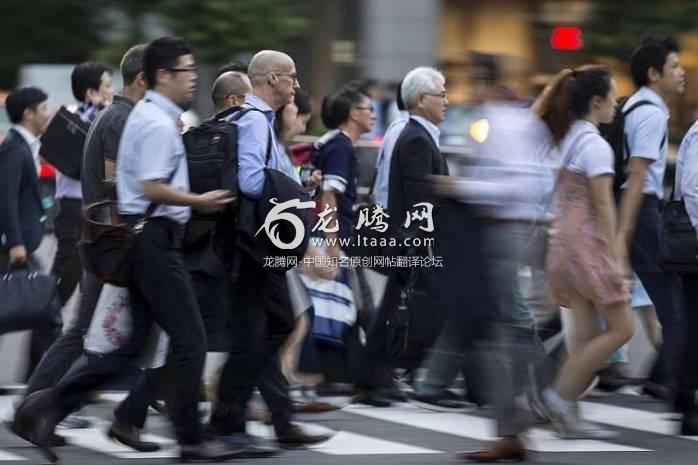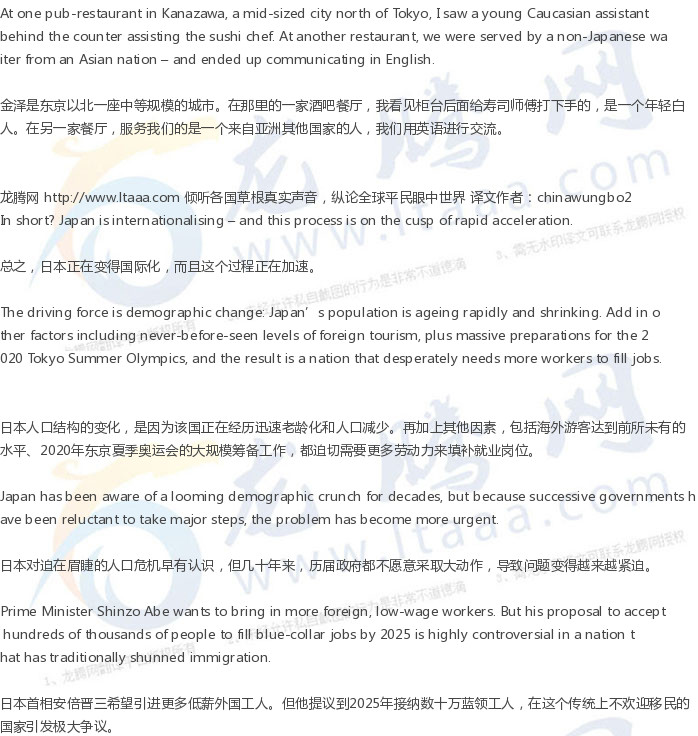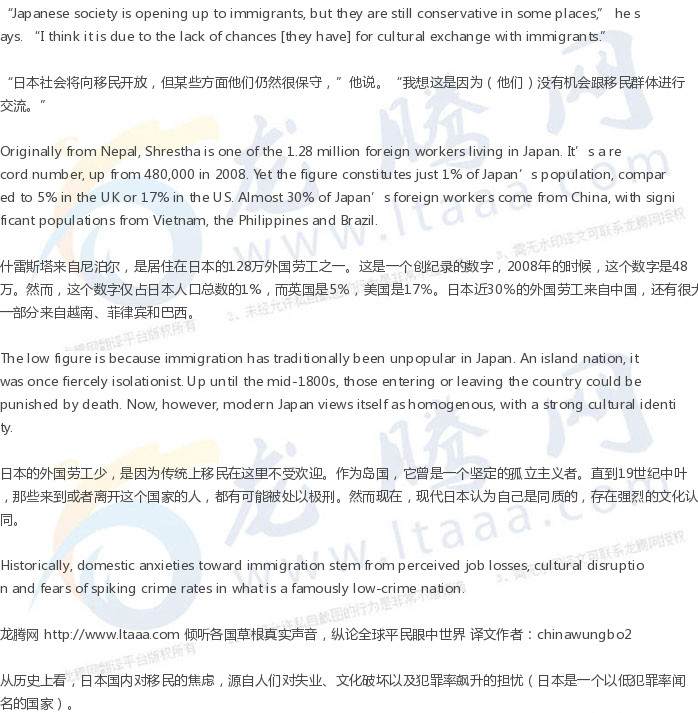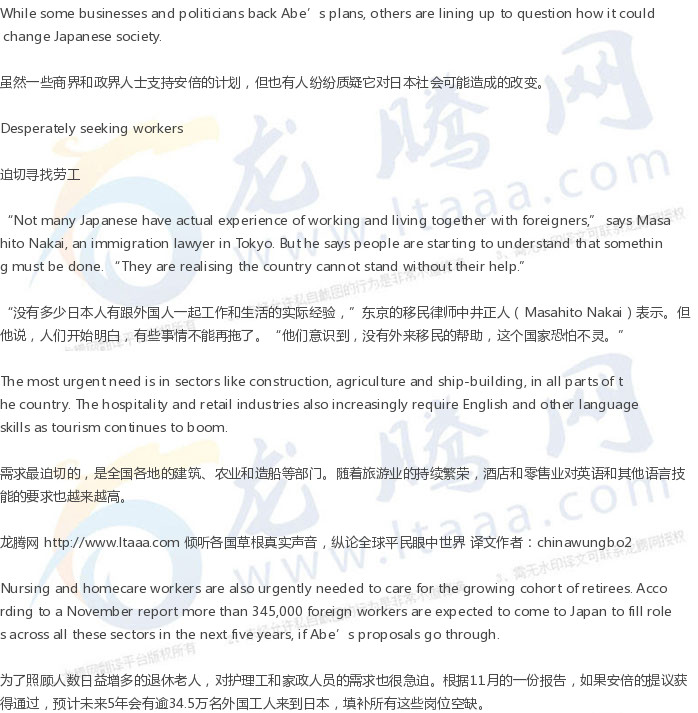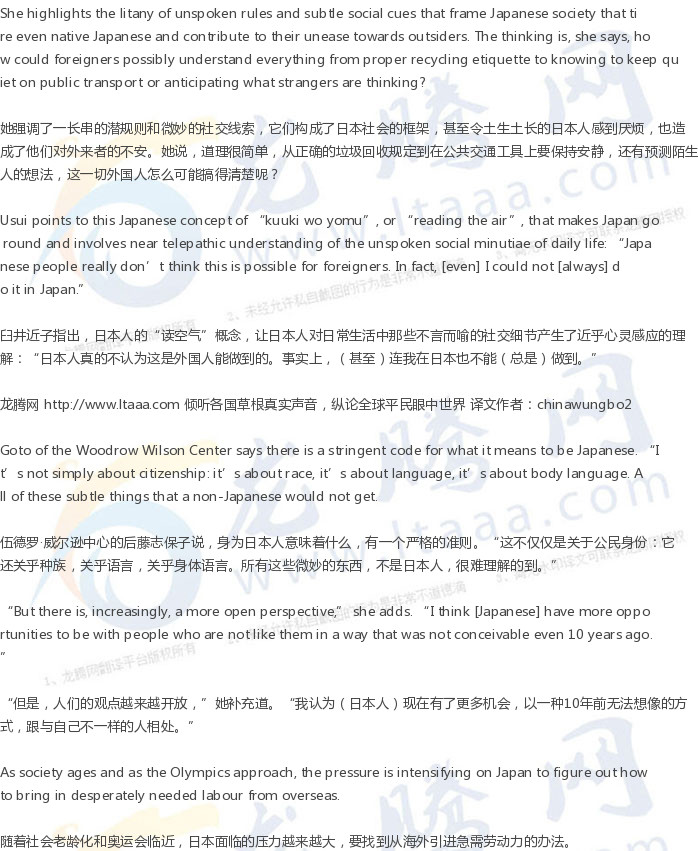老年人和外国人增多:日本正在发生怎样的变化 [美国媒体]
十年前,我居住在日本乡下时,很少遇见外国人。即便在东京,我这个人高马大的美国白人有时也会使当地人投来异样的目光。
Ten years ago, when I lived in the countryside of Japan, I seldom met foreigners. Even in Tokyo, I am a tall white American who sometimes makes the local people look different.
十年前,我居住在日本乡下时,很少遇见外国人。即便在东京,我这个人高马大的美国白人有时也会使当地人投来异样的目光。
But when I came here again last month, I was amazed at the enormity of the change. Every hotel, shopping mall and cafe has at least one foreign worker. At the service desk and the game hall, some young workers are not labeled with Japanese names on their work plates.
但上个月我再次来到这里,变化之大令我感到惊讶。每家酒店、购物中心、咖啡馆至少有一名外国打工者。在服务台和游戏厅,一些年轻工作人员的工牌上标注的并不是日本姓名。
On Saturday, Japan’s parliament accepted that proposal in a contentious and unprecedented move to let in more immigrant workers than ever before – 300,000 throughout the next five years, starting in April. The new bill comes at a time of historic change in Japan. And how everything shakes out could shape the country for generations.
周六,日本国会通过了让更多移民劳动力进入日本的法案,这是一个存在争议的、史无前例的举动——从4月开始,在未来5年达到30万人。随着新的法案出台,日本正在经历历史性变化。此事何去何从,可能会影响这个国家的几代人。
Spike in seniors, spike in foreigners
老龄人口激增,外国移民激增
Bhupal Shrestha is a university lecturer living in Tokyo’s Suginami ward, a residential area known for its narrow alleys lined with second-hand clothing and antique shops. He’s lived in Japan for 15 years, but the road to a “permanent resident” visa hasn’t always been a smooth one.
什雷斯塔(Bhupal Shrestha)是一名大学讲师,住在东京的杉并区,这个居住区以狭窄的小巷以及两旁的二手服装店和古董店闻名。他在日本生活了15年,但获得“永久居民”签证的道路并不一帆风顺。
He says he’s experienced “discrimination on basic things, such as searching for rooms for residences or businesses, opening bank accounts, applying for credit cards”. He also says it’s hard for immigrants themselves to have much say in the government policy that affects them.
他说,他经历过“在基本生活层面的各种歧视,像找房居住或者银行开户、申请信用卡”。他还说,移民群体在对他们有影响的政府决策中没有发言权。
But the big problem is this: the number of native Japanese is going down.
但一个大麻烦是:土生土长的日本人数量正在下降。
The population contracted by nearly a million people between 2010 and 2015 alone. Last year, it fell by another 227,000. In parallel, the number of residents over 65 hit a record 27% – a number that will rise to 40% in 2050.
仅2010年至2015年,日本的人口就减少了近100万。去年,人口又下降了22.7万。与此同时,65岁以上的居民数量达到了创纪录的27%,到2050年,这个数字将上升到40%。
In May, the job availability ratio hit the highest it’s been in 44 years: 160 jobs for every 100 workers. That means there are now lots of available jobs that older Japanese can’t do and that younger Japanese don’t want to do.
今年5月,空缺岗位率(job availability ratio)达到了44年来的最高水平:每100名工人面对160个职位空缺。这也就意味着,现在很多工作是日本老年人不能做,年轻人不愿意做的。
“Very dire” is how Shihoko Goto, senior associate at the Woodrow Wilson Center, a US think-tank, describes the situation. But she says in the past immigration “has really not been seen as part of a broader solution to some of the issues Japan is facing”.
“非常可怕,”美国智库伍德罗·威尔逊中心(Woodrow Wilson Center)的高级副研究员后藤志保子(Shihoko Goto)这样描述当前形势。但她表示,对于“日本所面临的一些问题”,过去并没有把移民“纳入更广泛的解决方案”。
To date, Japan has got around the issue of importing foreign workers by using a temporary “technical intern training programme”. This allows young labourers or students to work in low-wage roles for three to five years before going home.
迄今为止,日本通过临时性的“技能实习制度”来解决外国劳工的输入问题。年轻劳动者或学生在回国之前,可以通过这个方案在低工资岗位上工作三到五年。
But the programme has been criticised for exploiting workers in areas ranging from meagre pay to bad working conditions. Last year, it emerged that a 24-year-old Vietnamese man on the programme ended up handling radioactive nuclear waste as part of the Fukushima clean-up. It’s been criticised in the press for years, with some outlets dubbing it “servitude in disguise”.
但这个方案也因低工资和工作条件恶劣等原因,被批评为剥削工人。去年,一名24岁的越南男子被安排去做福岛核事故清理工作,处理放射性核废料,引发关注。多年来,这个方案一直饱受媒体的批评,一些媒体称之为“变相奴役”。
Now, Abe wants to allow low-skilled workers to stay for five years, and introduce a renewable visa for skilled workers, who would be allowed to bring their families. He wants the new visa schemes to launch in April.
现在,安倍希望允许低技能工人在日本停留五年,并为技术工人推出一种可续签的签证,允许他们带家人来日本。安倍希望这个新的签证方案能在4月启动。
Abe resists calling these workers “immigrants” though, and critics of his plan fear it could provide an easier path to permanent residency. There’s also concern that foreign workers would crowd cities and not live in rural areas where they are needed the most. Rights advocates, meanwhile, fear that Japan still has not learned how to adequately protect foreign workers from exploitation.
不过,安倍拒绝称这些工人为“移民”,而且批评该计划的人担心,它可能提供了一条获得永久居留权的方便途径。还有人担心,外国工人会涌入城市,而不是生活在最需要他们的乡村地区。与此同时,权益倡导人士也担心,日本仍未学会如何充分保护外国工人免受盘剥。
Takatoshi Ito, professor of international and public affairs at Columbia University, says he believes that Japanese society “is waking up to globalisation”. “So far, most [foreign workers] are helping economic growth, taking jobs the Japanese are not willing to take.”
哥伦比亚大学(Columbia University)国际与公共事务教授伊藤隆敏(Takatoshi Ito)表示,他认为日本社会“正在认识到全球化的重要性”。“到目前为止,大多数(外国工人)都在帮助经济增长,接下的是日本人不愿干的工作。”
But Nakai, the immigration lawyer, says securing a visa is just the beginning and that assimilating into Japanese culture can be difficult. He points to gaps in language and cultural knowledge as key challenges migrant workers face.
但移民律师中井正人表示,获得签证只是一个开始,难的可能是融入日本文化。他指出,语言和文化上的差异,是移民工人面临的主要挑战。
“If taxpayers agree, the government at least should provide free or cheap Japanese language courses over the archipelago as a first step,” Nakai says. Others think there isn’t much outreach in general.
“如果纳税人同意,作为第一步,政府至少应该在日本列岛向他们提供免费或廉价的日语课程,”中井正人说。另一些人则认为,配套服务在总体上是欠缺的。
“I think there are very few exchange events organised. There isn’t even communication between residents of the same apartment [block],” says Bhupal Shrestha. “When there is no understanding between neighbours, a multicultural society can’t be made.”
“我认为有组织的交流活动非常少,住在同一公寓楼里的甚至都没有交流,”什雷斯塔说。“邻里之间没有了解,就不可能形成多元文化社会。”
Culture clash
文化冲突
Chikako Usui, a sociologist at the University of Missouri in St Louis, says a variety of factors, from Japan’s isolationist history to its self-perceived homogeneity, give immigrants a rough go.
密苏里大学圣路易斯分校(University of Missouri in St Louis)的社会学家臼井近子(Chikako Usui)说,从日本的孤立主义历史到其自我认知上的同质性,种种因素都给移民带来困难。
Those moving to Japan need to know what they’re getting into, says Shrestha. He enjoys living in Japan, but says it is a place where “hard work is worshipped and rules are followed”. “It is better to come with some knowledge of Japanese culture and rules of daily life,” he says.
什雷斯塔说,那些搬到日本的人需要提前了解自己将会面对什么。他喜欢在日本的生活,但又表示,这是一个“崇尚努力工作、遵守规则”的地方。“最好对日本文化和日常生活规则有所了解。”
Meanwhile, the government will likely spend much of 2019 wrestling with an acceptable foreign worker solution. Until it can do that, the labour problem isn’t going anywhere.
与此同时,政府可能会在2019年的大部分时间里,找到一个各方可以接受的外籍劳工方案。在此之前,劳动力短缺的问题缓解无望。
版权声明
我们致力于传递世界各地老百姓最真实、最直接、最详尽的对中国的看法
【版权与免责声明】如发现内容存在版权问题,烦请提供相关信息发邮件,
我们将及时沟通与处理。本站内容除非来源注明五毛网,否则均为网友转载,涉及言论、版权与本站无关。
本文仅代表作者观点,不代表本站立场。
本文来自网络,如有侵权及时联系本网站。
图文文章RECOMMEND
热门文章HOT NEWS
-
1
Why do most people who have a positive view of China have been to ...
- 2
- 3
- 4
- 5
- 6
- 7
- 8
- 9
- 10
推荐文章HOT NEWS
-
1
Why do most people who have a positive view of China have been to ...
- 2
- 3
- 4
- 5
- 6
- 7
- 8
- 9
- 10
